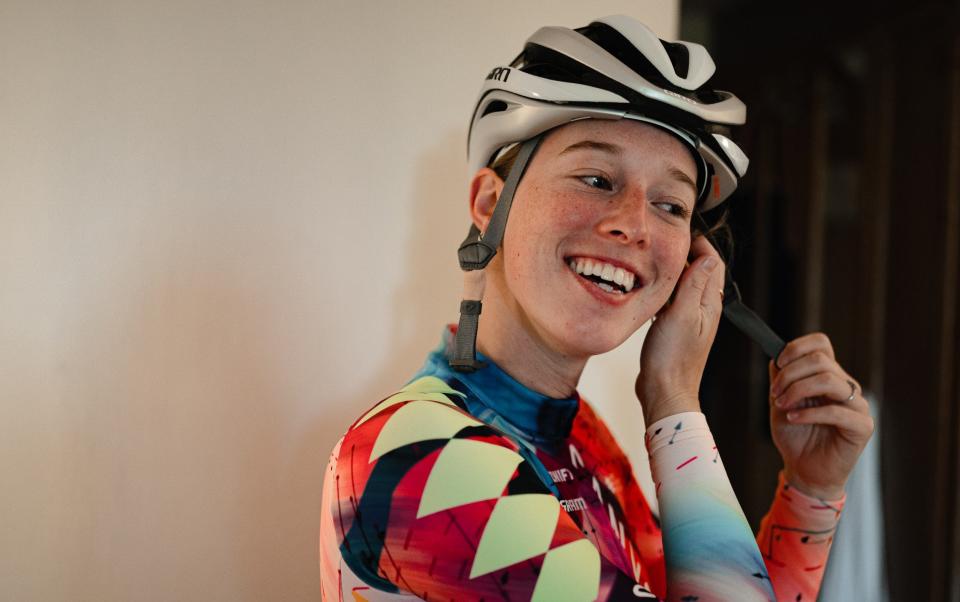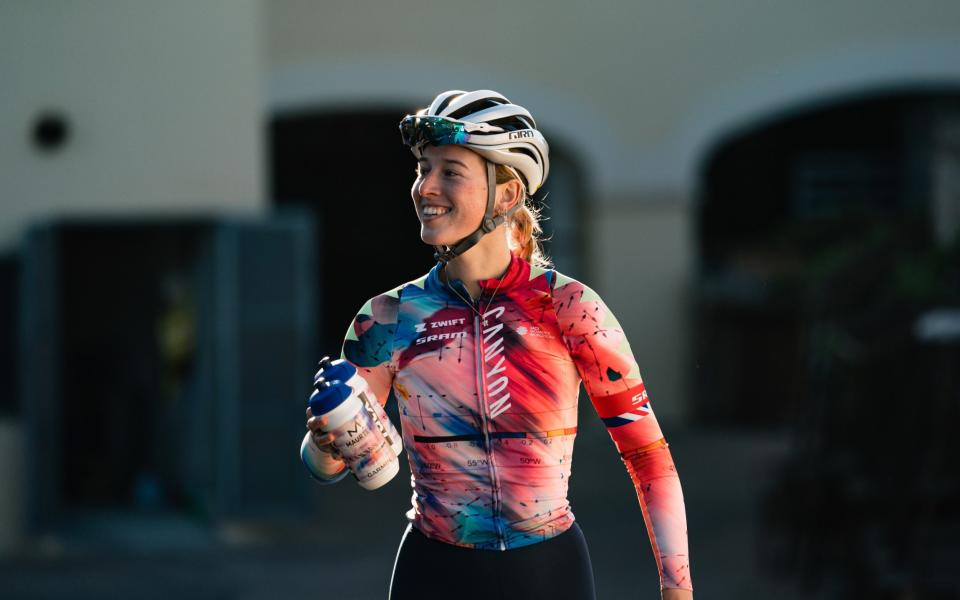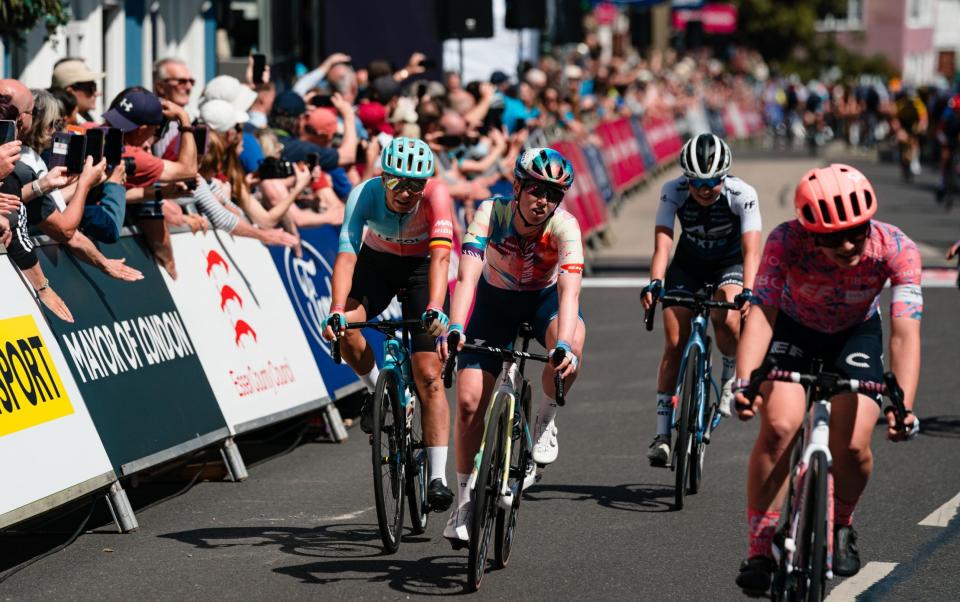Alice Barnes and Mark Cavendish interview: 'I wish people could see how exciting women's racing is'

Last month, British rider Alice Barnes was racing in The Women’s Tour when she spotted Mark Cavendish and his son, Casper, cheering from the side of the road near their house. Barnes had just finished her bottle, so she chucked it at little cycling-mad Casper as she whizzed by. Ever since, Casper has hardly drunk from anything else.
Barnes is unaware of the transformative effect that such a simple act would have on the son of Britain’s legendary cycling sprinter - until she hears it from the Manx Missile himself. The pair have joined Telegraph Sport on a virtual call ahead of a momentous weekend for women’s cycling, with the revival of the Tour de France Femmes avec Zwift launching in Paris on Sunday.
“It’s Alice’s Rainbow Bottle - that’s what he calls it,” laughs Cavendish. “He still drinks from it. That’s my little boy who loves cycling, he’s obsessed with this bottle that Alice threw to him. He knows male riders, he knows female riders, he just loves a bike race. That’s what we want - we want that to be the norm.”
Barnes’ face breaks into a smile. A former national road race and time trial champion, the 27-year-old narrowly missed out on selection for team Canyon-SRAM in this year’s Tour de France Femmes, but she is still buzzing that women’s cycling has finally bashed down a door that remained firmly shut for years.
Her older sister, Hannah, who rides for Norwegian team Uno-X, is one of six British women taking part in the race, which will see a field of 144 riders cover 1,209km of northern France, ending atop La Planche des Belles Filles“To be able to say that hopefully one day I will be able to ride in the Tour - or the fact that it’s even an option now for women in cycling - is huge,” says Barnes. “There is a history, but it’s been an inconsistent history, so hopefully going forward it will always be there,” she adds.

Various incarnations - some might say gimmicks - of a women’s Tour have been held since the last official one was staged in 1989, including the launch of the one-day La Course in 2014. Bumped onto the end of the men’s Tour, it was perpetually scoffed at as an afterthought. In the intervening years, the women’s peloton has fought for equal rights and better television coverage - even the odd crowdfunding campaign has popped up to plaster over the glaring disparities in prize purses for men and women at races, such as the Omloop Het Nieuwsblad, where last year’s winner Anna Van der Breggan pocketed €930. Her male counterpart bagged €16,000.
Predictably, it is a theme of this year’s Tour de France Femmes, where the history-making rider who pulls on the yellow-jersey will receive a tenth of what the men’s winner will pocket. Barnes, however, insists there are more pressing issues.
“I know there are women in the peloton at the Tour de France Femmes who won’t be getting paid and it’s crazy to think they’re working alongside trying to be a professional,” she says, her voice hardening. “That isn’t a thing in men’s cycling because there’s a minimum wage.
“In women’s cycling, the World Tour teams have minimum wage, but for wildcard entries into races, there isn’t always that baseline. There’s still a huge gap. There are a lot more women who are getting paid and who can do this professionally without doing another job, but we still have a long way to go.”
Cavendish is listening intently. The 37-year-old has been one of the more vocal advocates for women’s cycling within the men’s peloton, which he says is in part due to having a sport-mad daughter, Delilah, 10, and his proud feminist wife, Peta.

“It’s not nice to hear,” he says of the financial instability in female cycling. “Logically, when I started, the male peloton didn’t earn a lot of money, relative to what it is now. But we developed over 100 years. Women throughout cycling history have been pushing but it’s only this generation collectively who have collectively been able to move it on.
“I really feel sorry that Alice and her generation are never going to see the biggest benefits of what they’re doing for women’s cycling, it’s going to be the next generation. They’re breaking down the barriers so the next generation don’t have to. It’s just knowing that women shouldn’t have to fight harder just because they’re women.”
When Cavendish sprinted into the history books by equalling Eddy Merckx’ record of 34 stage wins at last year’s Tour de France from Nîmes to Carcassonn - where he went pushed himself to the limits of human exhaustion in gruelling heat and abrasive winds - he could have been forgiven for not mentioning the Tour de France Femmes, a race which had had just been unveiled but was yet to exist - in his post-race interview. But he was determined to drop it in.
“The thing is, I’ll talk about women’s cycling, but it’s not me that’s doing anything,” he says, his arms flailing around the webcam as if to emphasise the point. “I actually turned an interview down the other day because someone wanted me to speak about the Tour de France Femmes. I was like, ‘I’d rather you give the column inches to and the publicity to one of my female colleagues. The work they’re putting in now is why my daughter might have a choice of what to do. Honestly, I’m so grateful for that.”

Much has been made of the Tour de France Femmes' eight stages, which commentators argue could make for snappier, aggressive and ultimately more entertaining racing. The argument, though, as to whether women should - not could - race over three weeks like the men continues to spark fierce debate.
“It could be three weeks, but I don’t think it would be a good thing for women’s cycling,” says Barnes. “Our racing is very different from men's racing. The longer the racing gets - especially while we’re developing - is not a benefit, because it could make the racing less exciting.”
Cavendish chips in. “I wish people could see how exciting women’s racing is and the unpredictability of it,” he says. “Men’s racing has become a lot about attrition - there’s no real racing in it - if you understand bike racing, it’s very predictable. I’m a sprinter, I play chess on wheels, that’s what I do, and I see from women and junior racers the two best forms of racing in cycling for race, because you can see it playing out and it’s not always what you expect."
It offers an exciting glimpse into the Tour de France Femmes and its future - one where Barnes might toss another water bottle to a young fan after slogging it up a climb, blissfully unaware of how she is inspiring them to get on a bike.
Zwift, the global online fitness platform, is proud to be supporting the advancement of women's cycling as the inaugural presenting partner to the Tour de France Femmes avec Zwift.

